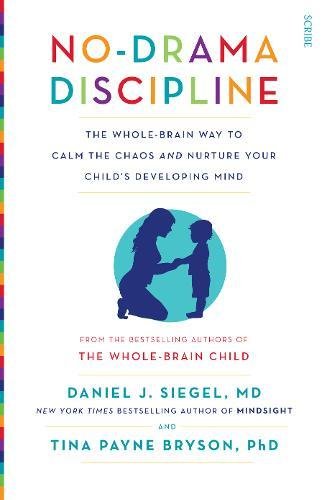Are you looking for a practical and empathetic approach to discipline that promotes your child’s emotional, social, and cognitive development? Look no further! In this review of No Drama Discipline, we’ll explore the key concepts, strategies, and benefits of this groundbreaking book by Daniel J. Siegel and Tina Payne Bryson.
No-Drama Discipline is a bestselling parenting guide focusing on nurturing a child’s developing mind through effective discipline strategies.
Both Siegel and Bryson are renowned experts in child psychology and have collaborated on several books, making them a powerful duo to provide insight into this important aspect of parenting.
This must-read book is part of our carefully curated best attachment parenting books collection.
Table of Contents
Introduction
No Drama Discipline: The Whole-Brain Way to Calm the Chaos and Nurture Your Child’s Developing Mind is a bestselling book that promises to revolutionize how you approach to discipline, aiming to create a loving, empathetic, and effective environment for your child’s emotional and cognitive development.
The authors state that “part of truly loving our kids, and giving them what they need, means offering them clear and consistent boundaries, creating predictable structure in their lives, as well as having high expectations for them”.

This philosophy underpins the book’s practical strategies and advice, designed to help parents foster a strong connection with their children while effectively addressing behavioral issues.
In this comprehensive book review, we’ll explore the book’s key concepts, practical strategies, and valuable insights to help you better understand and implement this transformative approach to discipline.
So, without further ado, let’s dive into this highly interesting parenting book!
Pros and Cons
Before we delve deeper into the book’s content, let’s quickly take a look at some of the pros and cons of No-Drama Discipline:
Pros:
- Evidence-based approach: The book’s content is grounded in research, providing readers with scientifically-backed strategies and advice.
- Comprehensive overview of the topic: The authors cover various topics related to child development, discipline, and brain science, offering a holistic view of the subject matter.
- Practical strategies and advice: Throughout the book, the authors provide actionable tips and techniques for dealing with various parenting challenges.
- Emphasis on empathy and connection: The book promotes a compassionate, understanding approach to discipline that prioritizes building strong relationships with children.
Cons:
- May not cover all parenting styles or situations: Some readers may find that the book does not address their specific challenges or align with their personal parenting philosophy.
- Some concepts may be challenging to grasp: Although the authors strive to present complex ideas in a clear, relatable manner, some readers may struggle to understand certain concepts fully.
No Drama Discipline Overview and Key Concepts
No-Drama Discipline introduces the “Whole-Brain” approach to discipline, which is grounded in the understanding that a child’s behavior is directly influenced by their neurological development.
The authors explain that effective discipline requires integrating the left and right hemispheres of the brain, as well as addressing the “upstairs” and “downstairs” regions responsible for higher-order thinking and more primitive instincts, respectively.
One of the book’s central concepts is the strategy of “Connect and Redirect.” Siegel and Bryson argue that parents should first connect with their child emotionally (using the right brain) before redirecting any bad behavior (using the left brain).
This approach helps maintain a strong parent-child bond and promotes the development of essential life skills such as emotional regulation, empathy, and problem-solving.
Strategies and Practical Advice
No-Drama Discipline offers a wealth of practical advice and strategies for implementing its core concepts. Here are some key takeaways:
- The “No-Drama” approach to discipline: This approach involves calmly and empathetically addressing a child’s misbehavior, rather than resorting to yelling, punishment, or other punitive measures (such as time-out) that can exacerbate the situation and damage the parent-child relationship.
- Connect and Redirect: When faced with challenging behavior, parents should first empathize with their child’s feelings and offer comfort. Then address the issue and guide the child toward more appropriate behavior, helping them make better decisions. For example, getting down to eye level is a simple method to connect with your child in a more receptive state. As the authors explain, “when your children are feeling upset, a loving touch can calm things down and help you connect, even during moments of high stress”.
- Real-life examples: The book includes numerous relatable examples and scenarios demonstrating how to apply the strategies and techniques presented in various situations.
- Empathy and understanding: Throughout the book, the authors emphasize the importance of empathy and understanding when dealing with children’s behavior.

By putting ourselves in our child’s shoes, we can better understand their perspective, needs, and emotions, which ultimately helps us respond more effectively and compassionately.
How a parent reacts to misbehavior becomes one of the key drivers of how a child reacts.
Criticisms and Omissions
While No-Drama Discipline has garnered significant praise for its content and approach, some criticisms have been noted:
- Pace and repetition: Some readers find the book slow and repetitive, arguing that the authors could have presented the same information more concisely.
- Not all-encompassing: Although the book covers a broad range of topics, it may not address every parenting challenge or apply to all parenting styles.
- Complex concepts: While the authors do their best to simplify complex ideas, some readers may struggle to fully understand certain concepts or feel overwhelmed by the depth of the material.
Acknowledging these criticisms and considering alternative viewpoints or resources for those seeking additional information or guidance is essential.
Who Should Read No Drama Discipline
No-Drama Discipline is an excellent resource for parents, caregivers, and educators who want to understand children’s neurological development better and apply this knowledge to discipline.
The book’s emphasis on empathy, connection, and practical strategies makes it a valuable tool for anyone looking to foster stronger relationships with the children in their lives.
While the book’s content may be more relevant to some parenting styles than others, it offers valuable insights and techniques that can benefit a wide range of individuals.
By understanding and implementing the Whole-Brain approach to discipline, parents can more effectively address behavioral challenges and support their child’s emotional, social, and cognitive development.
Conclusion
In summary, this review of No-Drama Discipline highlights the book’s valuable contributions to the field of parenting and child development.
Its evidence-based approach, practical advice, and focus on empathy and connection make it a must-read for anyone looking to improve their disciplinary strategies and nurture their child’s developing mind.
Despite some criticisms regarding its pace and repetitiveness, No-Drama Discipline offers a wealth of information and actionable strategies that have proven effective for countless families.
So, if you’re ready to dive into the world of Whole-Brain parenting and transform your approach to discipline, this book may be the perfect starting point.
Related Book Reviews:
Review of Attachment Parenting: Instinctive Care for Your Baby and Young Child

